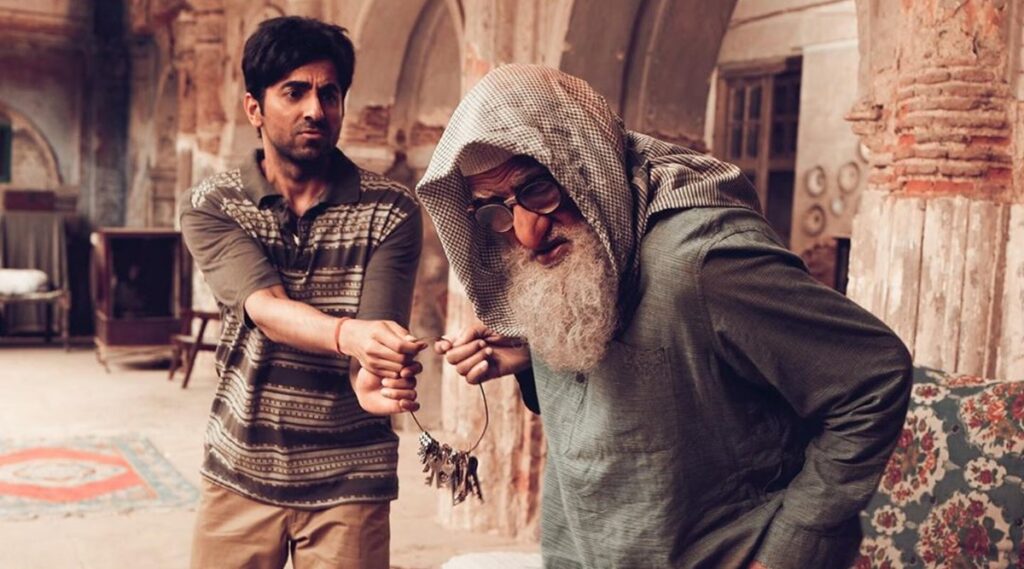Director Shoojit Sircar’s fifth collaboration with writer Juhi Chaturvedi Gulabo Sitabo begins with an ode to a traditional Lakhnavi artform: A glove-puppeteer regales passers-by with the humorous tale of a man’s wife and his mistress – a disagreeable pair that incessantly bicker over trivial matters.
Not only has the film’s title been derived from this evanescent art-form, it also hints at the relationship our comically petty protagonists are going to share. The gluttonous landlord Mirza (Amitabh Bachchan) and his long-time, uneducated tenant Baankey (Ayushmann Khurrana) are the re-imagined life-size puppets.
This is a story fueled by male avarice. The manifestation of everyone’s greed is a crumbling but pictureusque haveli (Fatima Mahal) owned by Mirza’s begum (Farrukh Jaffar), much to his misery; he impatiently awaits her death, so as to keep the massive structure all for himself, without the parasitic tenants. Baankey has a loud mouth for someone that pays a measly 30 rupees rent, and is naturally opposed to this (along with the other tenants). The central conflict is set up.
Recommended: 18 Feel-Good Bollywood Movies To Make Your Day
Matters further complicate when the subplots of archaeologist Gyanesh Shukla (Vijay Raaz), lawyer Cristopher Clarke (Brijendra Kala), local politician ‘Jeeja ji’ (Rehan Kidwai), and builder Munmun ji (Jogi Mallang) are added to the mix. Everyone has their eyes on the prize.
But the most appealing aspects of the film are not the premise, story, or the conflicts between characters. Chaturvedi (born and brought up in Lucknow) possesses prowess at patiently easing an audience into the sedate milieu. One of her biggest strengths on display is the understanding and usage of language. The Hindi-Urdu spoken reeks of authenticity. It is refreshingly far away from Bollywood caricature. Phrases like ‘gol gaphaala’ and ‘khopadiyan mai bhaisiyaan ghus gayi hain’ are music to ears inundated with excessive Hinglish. The inherent comedy of the language is also fully exploited in the script.
It must be noted that this goal couldn’t have been accomplished without Sircar’s vision. He assuredly captures the essence of the city: shots of unhurried cycle rickshaws, interactions with roadside vendors, the massive courtyard of the haveli where all parties gather, abandoned Ambassadors parked away in narrow lanes, all combine to synthesize the desired effect.
Recommended: 13 Best Hindi Comedy Movies On Amazon Prime
DOP Avik Mukhopadhyay, another regular collaborator of Sircar’s, does a very fine job with his work to lend to the film’s feel. One particular shot, where Mirza sees Baankey through a broken toilet’s brick wall, is quite memorable. The film is a masterclass in collaboration resulting in non-kinetic world-building.
There are very few people in the world for whom age is truly just a number. Amitabh Bachchan is one of them. Having moved from his conventional megastar status in recent years to meatier roles, he is unafraid to dig into the character of the irritable, scheming hunchback. His exaggerated make-up, his comic timing, every second of Mirza is an absolute delight throughout the film. A truly impressive performance.
Khurana’s Baankey falls short of the aforementioned. But that is to some extent the part he was meant to play. His minor lisp is an interesting nuance. While his performance could have had more depth to it based off of his father’s early death, there is a silent rage boiling in him that stems from his circumstance: a lack of education, a nothing job selling ‘gehoon’, his sisters’ repeated mockery. Overall, there seemed to be more potential in the character.
Recommended: 22 Must Watch Bollywood Movies From Women Filmmakers
Vijay Raaz has reverted to playing a comedy character, after his acclaimed dramatic performance in Gully Boy last year, and it is clear why his stints in films like Delhi Belly and Welcome are evergreen. His performance lacks its usual bite, but he still hits all the right notes. Kala’s Cristopher Clarkefeels a tad unidimensional; it seems like the actor was cramped in a film with too many characters. The same goes for Mirza’s only ‘friend’, Pandey Ji (Shri Prakash Bajpai).
Juhi Chaturvedi’s treatment of female characters is another feather in the film’s cap. Typical female tropes are expertly subverted, giving birth to real characters with agency and aspirations. Baankey’s sister, Guddo (an excellent Shrishti Shrivastava), epitomizes this theme. Her no-nonsense attitude while arguing with Cristopher, openness of lust, pursuit for self-sufficiency, and subtle digs at the ‘man’ in the family are hallmarks of a female character that holds her own.
There is also a poetic, almost karmic twist in the film, flipping the situation on its head for the greedy men. Gulabo Sitabo might be a film about two bickering men, but the show is unmistakably run by the women. Nonetheless, the film could have done more with earnest conversations between Guddo and her mother (or sisters) in sacrifice of some needless characters.
Recommended: 18 Best Bollywood Comedy Movies Of All Time
There are definitely flaws in the film. The redundant usage of a particular sound effect in any funny moment to ‘enhance the comedy’ is reminiscent of laugh tracks in shows that don’t believe in their writing. The film is filled with chuckle-worthy moments, but these become few and far in between at times. Pacing is a glaring issue here; the initial world-building is gradual, which works, but the middle portion is extremely dragged out in scenes without which the film would have worked better.
Another issue that came through was the lack of depth in characters, mostly due to a forced effort at making them funny. Any great dramedy or satire needs a strong emotional quotient to balance out the humour. Take Khosla Ka Ghosla as an example. Otherwise, the risk is run of keeping the characters in their same states consistently, and the audience is kept waiting for change.
Recommended: 48 Best Bollywood Movies On Amazon Prime For Your Weekend Binge
Other than gender, the film does not overtly stray into today’s political sphere, despite having a Muslim and Hindu character in battle. However, there was one rather interesting experience for me as a viewer. While it is probably a matter of intent versus impact, there is an eery, almost Simpsons-esque prophetic feel to government officials instructing a Muslim man (Mirza) to produce documentation and ‘kaagaz’ as proof of residence. Probably an unintentional allegory (owing to when the script was written), it was still an interesting and uncomfortable personal tone in the narrative. This simply shows that it is equally important to know when a piece of art was made and when it was watched. | (Related: 16 New Bollywood Movies We’re Excited About In 2020)
The film’s moral compass is subtly placed through the songs. It is very exciting to hear songs in this medium which actually add to the experience and narrative, rather than act as an aside from storytelling. The songs discuss inherent themes such as the futility of materialism and the way life’s unexpected twists turn us into puppets.
The characters are Juhi Chaturvedi’s puppets, dancing to the story’s tune in Lucknow, and we are the amused passers-by, sitting at home thankful for the film.
Watch Gulabo Sitabo On Amazon Prime Video
Rating: 3.5/5
By Abhay Budki





2 thoughts on “Gulabo Sitabo (2020) Review: An Engaging Karmic Dramedy”